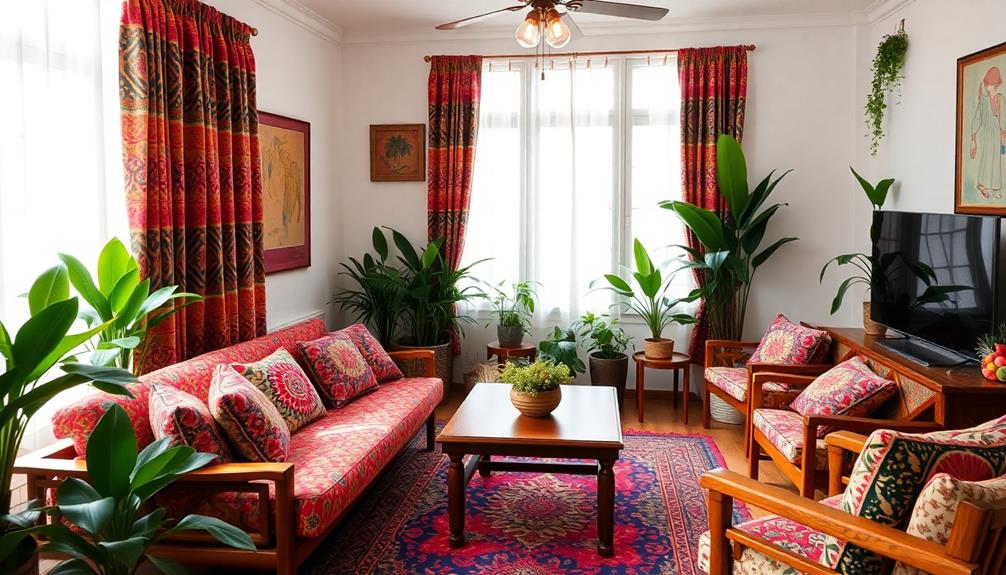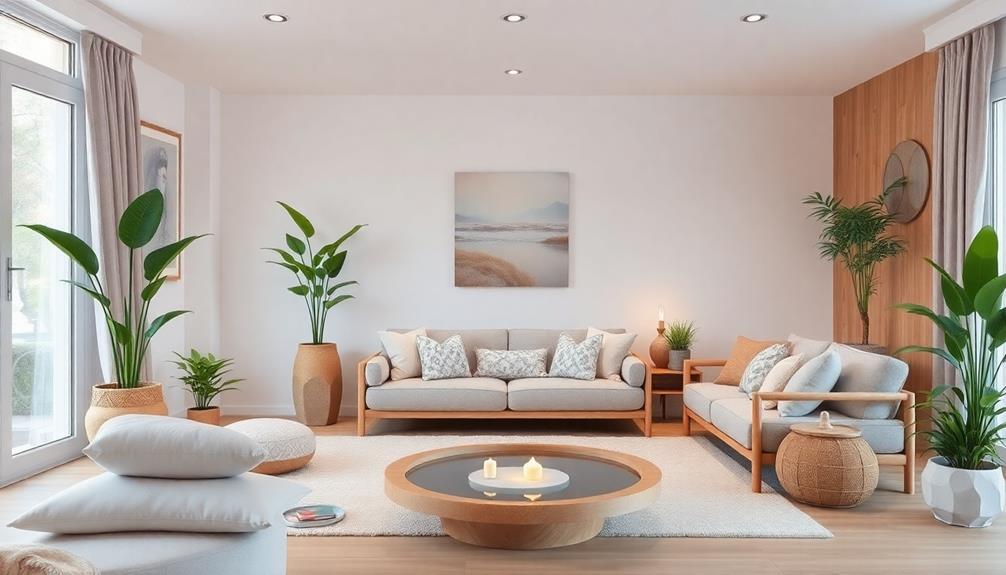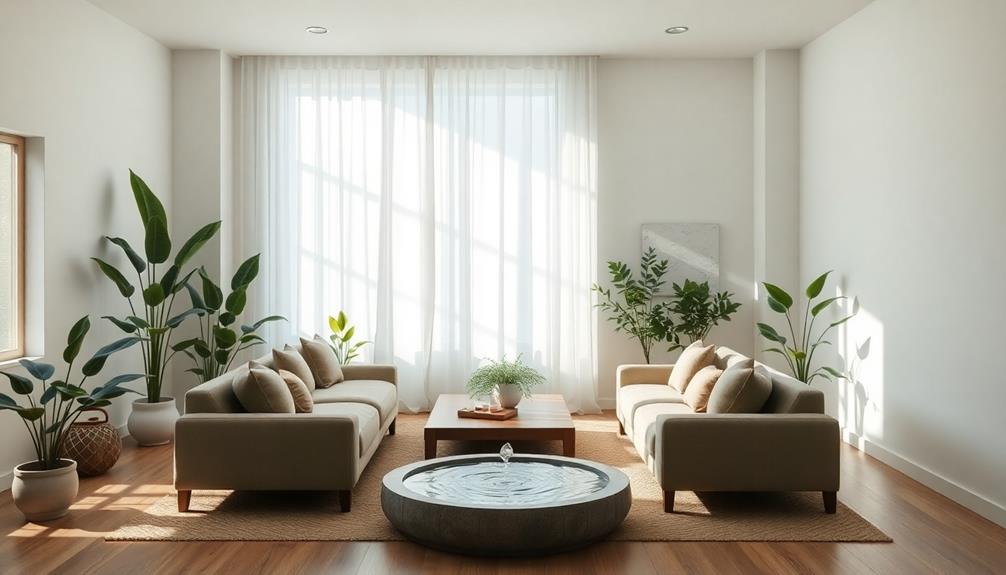You're not alone if you've noticed the batik trend sweeping through homes everywhere. This vibrant fabric art transforms plain textiles into stunning, intricate designs using traditional techniques. By incorporating batik into your decor, you can add unique textures and rich cultural heritage to your living space. Consider accent pillows, quilts, or window treatments to create warmth and visual interest. Batik also beautifully frames your walls as art, showcasing craftsmanship and history. Don't miss the chance to enhance your home with this enchanting trend—there's so much more to discover about batik's versatility and impact on modern decor.
Key Takeaways
- Batik fabrics enhance home decor with their unique textures and rich cultural heritage, creating inviting and vibrant spaces.
- Accent pillows and quilts featuring batik designs serve as eye-catching statement pieces, adding warmth and personality to living areas.
- Batik window treatments beautifully filter light while showcasing intricate patterns, elevating the aesthetic of any room.
- Framed batik pieces can be used as wall art, celebrating craftsmanship and adding a touch of history to your decor.
- The trend merges traditional techniques with modern aesthetics, ensuring batik remains relevant and appealing in contemporary home design.
Understanding Batik
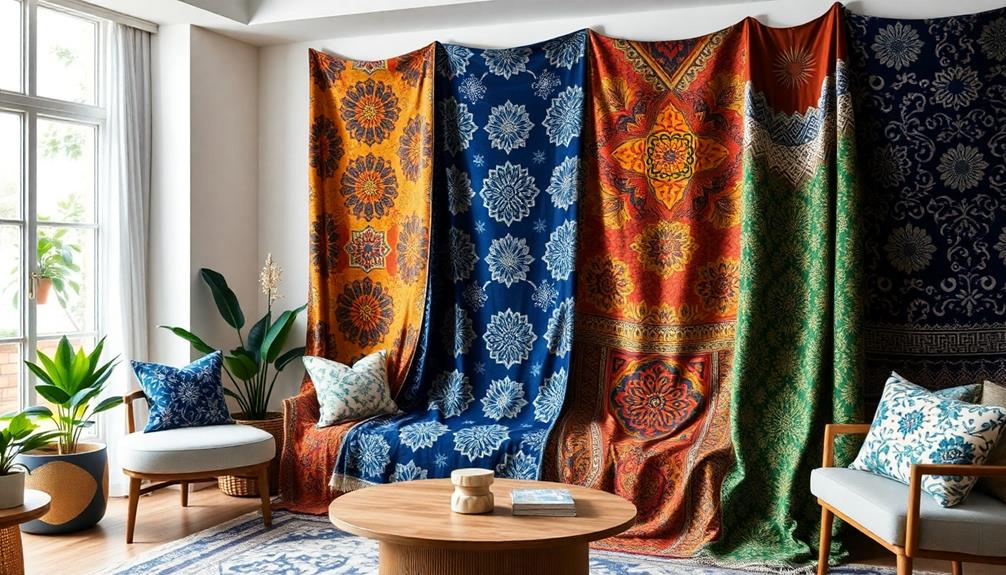
Batik is more than just a fabric; it's a vibrant tapestry of history and artistry. When you immerse yourself in the world of batik, you uncover a fascinating batik process that transforms plain fabric into stunning works of art.
This traditional batik technique involves applying hot wax to fabric, allowing artisans to create intricate patterns that resist dyeing. After dye baths, the wax gets removed with hot water, revealing unique designs that reflect the artisan's skill and creativity. The artistry of batik is akin to the craftsmanship seen in traditional Indonesian decor masks, showcasing the rich cultural heritage and creativity of skilled artisans.
There are various batik techniques you can explore, such as Batik Tulis, which is hand-drawn; Batik Cap, which is stamped; and Batik Lukis, where the fabric is painted. Each technique showcases different levels of craftsmanship and complexity, making the art form even more enchanting.
Batik patterns often carry deep cultural meanings, representing social status, nature, and local traditions. This connection to cultural heritage is what makes batik truly special.
Recognized by UNESCO, batik isn't just a decorative fabric; it's a reflection of identity and community, making it an essential addition to your home decor. Embrace the beauty of batik and celebrate its rich history and artistry in your space.
Historical Significance of Batik
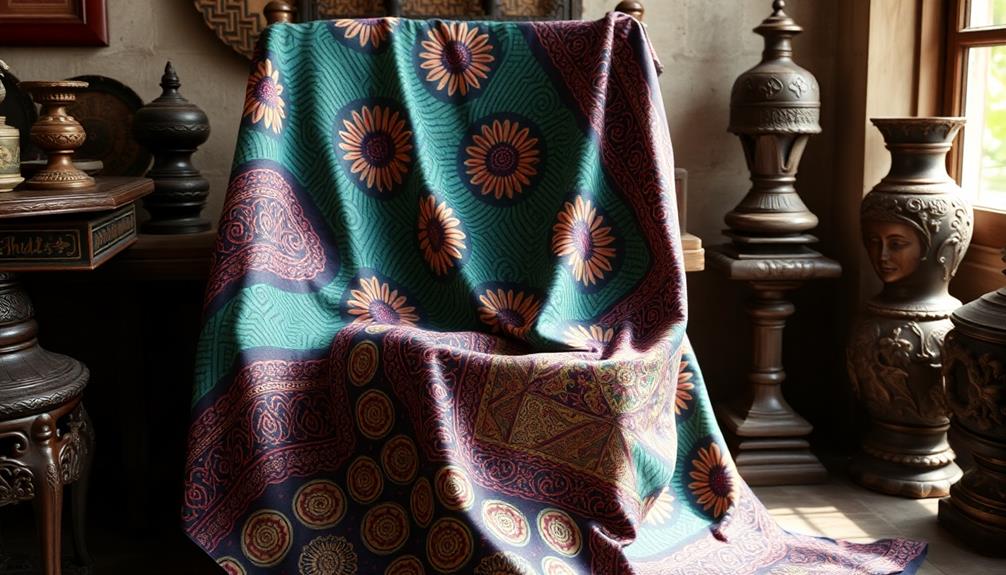
The rich artistry of batik extends beyond its visual appeal; it carries a profound historical significance that connects various cultures across continents. The history of batik dates back over 2,000 years, with roots in Asia, India, and the Middle East. This ancient practice reflects its long-standing cultural importance and is often celebrated in various forms of Indonesian decor, including Indonesian decorative pillows that showcase vibrant colors and intricate patterns.
The term "batik" originates from the Javanese word "bathikan," which means to draw or mark, emphasizing its artisanal nature in fabric decoration.
In 2009, UNESCO recognized Indonesian batik as a masterpiece of Oral and Intangible Heritage of Humanity, highlighting its crucial role in Indonesian culture. Historical artifacts, such as batik screens from Japan dating back to 700 AD and cave frescoes in India, showcase the widespread use of batik across diverse civilizations.
In Java, batik motifs often symbolize social status, nature, and significant historical events. These deeper meanings embedded within the designs continue to resonate today, making batik not just a decorative fabric but a narrative of cultural identity.
Batik Creation Techniques
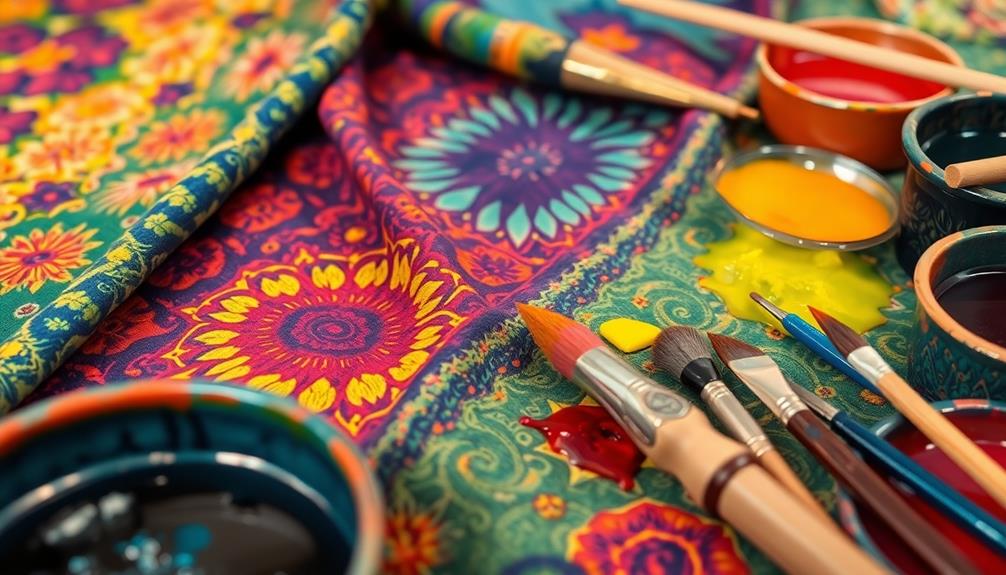
In creating batik, artisans skillfully apply hot wax to fabric, employing tools like the canting for detailed designs or stamps for quicker patterns. This technique creates a resist effect against dye, allowing for beautiful and intricate designs to emerge.
The artistry behind batik is reminiscent of the intricate designs found in Indonesian decor masks, which also reflect local myths and folklore.
Here's a glimpse into the batik creation process:
- Wax Application: Artisans use canting or stamps to apply hot wax, outlining their designs and protecting certain areas of the fabric.
- Dyeing: The waxed fabric is submerged in dye baths. The areas covered in wax remain untouched, resulting in vivid contrasts.
- Wax Removal: After dyeing, the wax is removed by soaking the fabric in hot water, revealing the rich textures and colors of the final design.
- Layering Techniques: Artists often repeat the waxing and dyeing process multiple times, adding depth and complexity to their creations.
Batik styles vary widely, from the labor-intensive Batik Tulis, celebrated for its artistry, to the quicker Batik Cap.
Each technique showcases the skill of batik artists and their unique interpretations, making every piece a work of art.
Incorporating Batik in Decor

Artisans' mastery of batik techniques opens up exciting possibilities for home decor. By incorporating batik fabrics into your design, you can elevate your spaces with unique textures and patterns that showcase cultural heritage.
Additionally, consider exploring the use of Indonesian decor masks as complementary decorative elements; they enhance the cultural narrative of your home. Try adding batik accent pillows to your living room; they create visual interest when paired with simpler fabrics and bring warmth to your space.
Batik quilts are another fantastic option. Not only do they provide comfort, but they also serve as vibrant statement pieces for beds or sofas, showcasing intricate designs that can spark conversation.
If you're looking for striking focal points, consider using batik for window treatments. The beauty of the fabric filters natural light, enhancing your overall aesthetic.
Lastly, don't overlook the potential of framed batik fabrics as wall art. They add a rustic and artistic touch to your interiors while celebrating the craftsmanship and history of this traditional textile.
With these ideas, you can seamlessly incorporate batik into your home design, making each piece a distinct work of art that reflects your style and appreciation for craftsmanship. Whether you choose to highlight batik with statement cushions, elaborate wall hangings, or even custom upholstery, the possibilities are endless. By thoughtfully selecting gorgeous batik designs for home, you can create a personalized space that adds warmth, color, and a rich cultural dimension. Each room will tell a story, showcasing the intricate craftsmanship and artistic expression that batik is renowned for.
The Future of Batik Design

Emerging trends in batik design are reshaping the way you perceive this traditional art form. Contemporary artists are now blending classic techniques with modern aesthetics, making batik more appealing to younger audiences. The future looks bright, especially with several key developments in the batik industry, which reflect the rich cultural heritage of Indonesia that influences various art forms.
Additionally, the integration of sustainable practices aligns with the growing awareness of environmental concerns in housing and textiles.
- Sustainability: Ethical sourcing and a focus on sustainable practices are becoming central themes, reflecting the cultural significance behind authentic batik textiles.
- DIY Engagement: Workshops and DIY batik kits are rising in popularity, empowering you to explore your creativity while preserving traditional skills.
- Collaborative Innovation: Partnerships between artisans and fashion designers are producing innovative collections that balance heritage with contemporary flair, reaching a global market.
- Cultural Narratives: Projects like the Healing Batik initiative are emphasizing socio-political stories within batik artistry, ensuring the art's relevance in future expressions.
These trends highlight how batik is evolving beyond mere decoration, transforming into a powerful medium of expression that connects cultures and generations.
Embrace this evolution and discover how batik can enrich your home and understanding of art.
Frequently Asked Questions
Why Is Batik so Special?
Batik's special because each piece tells a unique story through intricate patterns and vibrant colors. You're not just decorating; you're embracing a rich cultural heritage that connects you to history and artistry across generations.
What Is the Batik Effect?
Imagine wrapping yourself in a tapestry of culture. The batik effect showcases unique textures and intricate patterns, using wax-resist dyeing to create one-of-a-kind pieces that add vibrant personality and depth to your home decor.
What Are the 5 Major Types of Batik Design?
You'll find five major types of batik design: Batik Tulis, Batik Cap, Batik Lukis, Batik Pesisir, and Batik Belanda. Each showcases unique techniques and cultural influences, reflecting the rich diversity of batik art.
What Is the Batik Technique in Indonesia?
Did you know UNESCO recognized batik as a Masterpiece of Intangible Heritage? The batik technique involves applying hot wax on fabric, creating intricate patterns before dyeing, showcasing Indonesia's rich cultural heritage and craftsmanship through its unique designs.
Conclusion
Batik's vibrant patterns can transform your home like a splash of color on a blank canvas. As its historical roots and unique craftsmanship capture your imagination, don't hesitate to embrace this trend. By incorporating batik into your decor, you'll not only elevate your space but also celebrate a rich tradition. So, immerse yourself in the world of batik and let your home reflect your style and appreciation for artistry. There's no better time to add this beautiful touch!

